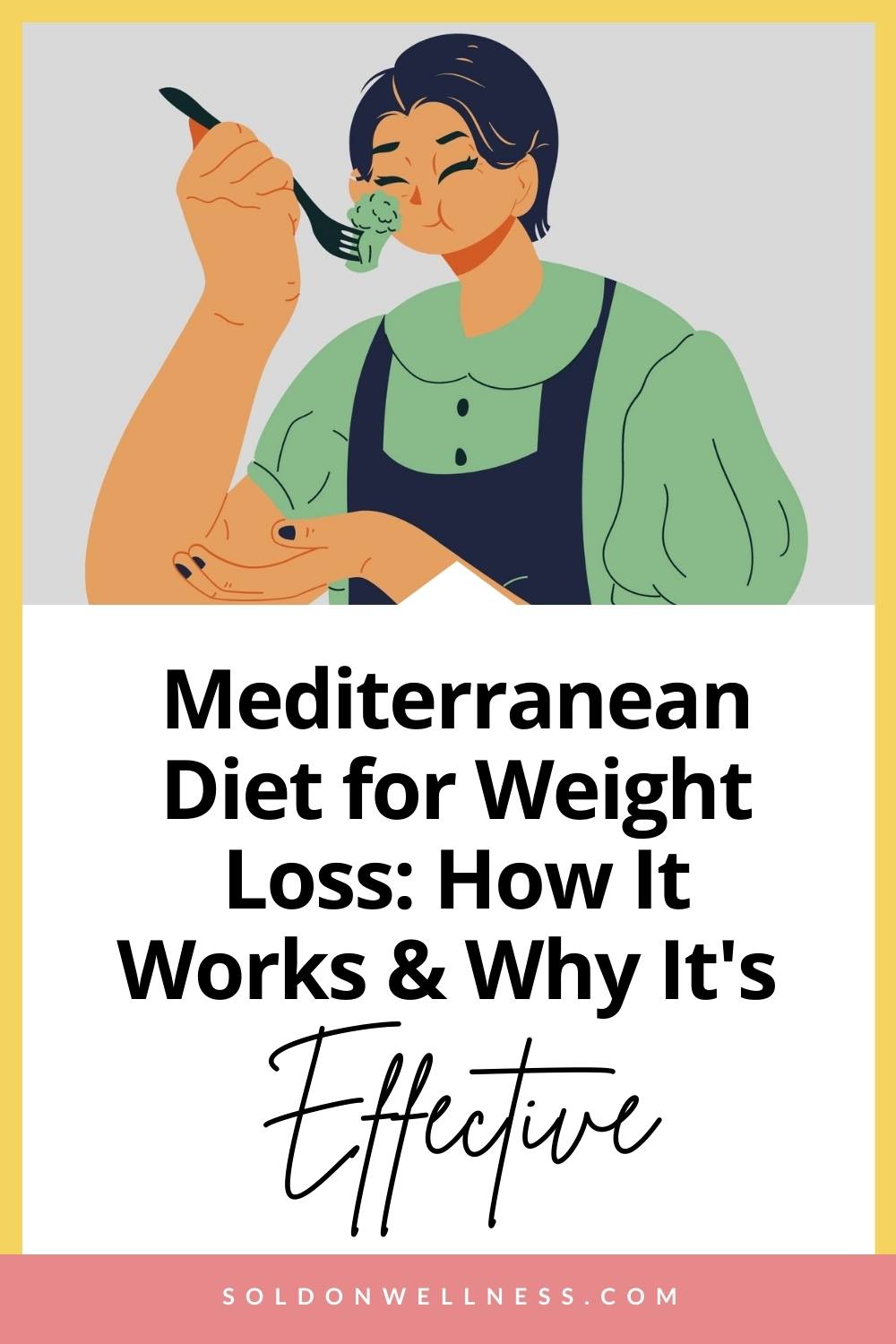Mediterranean diet for weight loss is one of the best diets for weight loss. A recent study suggests that the Mediterranean diet, with or without calorie restriction, is effective and leads to sustainable changes in dietary habits.
It includes moderate portions of olive oil, fresh fruit and vegetables, whole grains, and nuts.
The diet can all be combined into a simple lifestyle change that will keep you healthy and happy without spending too much time cooking or exercising!
This article will cover how the Mediterranean diet for weight loss works and why it's so effective.
What is the Mediterranean Diet

The Mediterranean way of eating is rich in plant-based foods, which have been shown to lower inflammation levels in the body (and higher levels of inflammation can lead to weight gain).
This means that even if you don't enjoy cooking or exercising, you'll still see results from following this diet since it doesn't require either. The tradeoff? You'll be healthy and full of energy! -Olive oil is a highly healthy fat.
It may aid in weight loss since it has been shown to lower "bad" cholesterol (low-density lipoprotein). When there are fewer cholesterols in the blood, the liver will start converting any extra calories into fat for storage.
Any calorie not turned into fat will then be used as energy! -Nuts are an important part of a Mediterranean diet because they have been shown to curb hunger for hours at a time.
Additionally, when you do become hungry, the nuts in this diet will keep you satiated while allowing you to avoid that snack attack.
The benefits of following a Mediterranean diet

The Mediterranean diets are popular for a lot of reasons. The main goals of this diet are to increase the amount of vegetables, fruits, and grains that you eat while reducing the amount of meat that you eat.
This diet is different from other diets because it allows many foods that other diets might not allow, like wine, whole grains, and pasta.
The Mediterranean diet is backed by research saying that it can help with weight loss and prevent cancer, among other health benefits.
It's a great way to improve your health without making too many changes to your lifestyle. It's easy to follow and sustainable, which makes it perfect!
According to WebMD, one study showed that people who consumed a Mediterranean-style diet had larger waist circumference reductions than people who followed the American Heart Association or DASH diets.
Another study found that middle-aged women who adhered closely to the Mediterranean diet were less likely to gain weight over a period of five years than those who ate a low-fat diet.
The Mediterranean diet includes many foods that are high in fiber, such as whole grains and beans. Fiber can be found naturally in vegetables, fruits, legumes, nuts, seeds, etc.
It's a key component for weight loss because it helps you feel fuller longer, preventing overeating.
Whole grains also contain many essential vitamins and minerals, such as selenium which helps to prevent cancer.
The Mediterranean diet is one of the best diets for weight loss because it keeps you feeling full but isn't too strict on portion sizes, making a person feel deprived.
Since it's easier to stick with than other diets, it may be a great option if you have a busy lifestyle or difficulty sticking with other diets.
Another good thing about this diet is that it's very flexible and doesn't require you to eat the same food every day.
You can also make substitutions within the diet, so it fits your personal preferences.
The only requirement is that a majority of your diet consists of foods associated with the Mediterranean diet.
How to start following this diet

To start following the Mediterranean diet, you should consider
1. Reducing your consumption of red meat, instead, eat more poultry and fish in this diet. This is a good chance to make because meat can be pretty high in saturated fats.
2. You can also try replacing white rice with brown rice and white flour with whole wheat bread and pasta.
3. Another thing that you'll want to do is replace yoghurt or low-fat cheese for your morning coffee or tea if you feel you need an extra energy boost for the day.
4. Replacing sugar with a sweetener that uses xylitol. Xylitol is a kind of sweetener that helps to fight cavities.
5. It also helps to cut down on the calories you consume, and it can help protect people from diabetes.
6. You'll also want to eat plenty of fruits and vegetables in your Mediterranean diet.
It would help if you tried drinking vegetable juice as an alternative or supplement when you need a beverage to drink at a meal.
Vegetable juice is usually an excellent way for you to get the vitamins and nutrients from vegetables without taking in too many calories or fat.
7. This diet will often use more fish than meat, peanuts, olives, avocados or seeds for added protein.
8. You'll also want to have a rich diet in one of the unsaturated fats that come from olives, avocadoes and nuts when you're trying to lose weight.
These are healthy fats because they don't contain any saturated fats or trans-fats.
Many of the foods recommended for people on this diet are also low in calories, which means that you won't eat as much food and feel more full than you usually would.
This can help to keep your weight down when you're trying to lose it.
Because this diet is a Mediterranean-style diet instead of simply being about eating fish and vegetables, there are quite a few options for good-tasting meals containing healthy ingredients.
This makes it easier for you to stay with the diet and still eat healthy food without feeling deprived of your favourite meals.
13 Tips on how to stay in the habit of eating healthy foods

Tips for staying in the habit of eating healthy foods when you're not feeling hungry or have no time to cook them:
- Try some fresh fruit like an apple. They take the shortest amount of time to eat, and they're also portable, so you can easily bring them to work for lunch.
- Experiment with different vegetables that you might not normally eat. Again, they're easy to snack on, but they'll also help add veggies to your diet.
- Keep some sliced almonds at work or home for a quick protein fix.
- Chill soup in the fridge for a delicious and easy meal on a night that you don't feel like cooking!
- Dried fruits make for a quick snack with little or no preparation time needed on your part.
- Try some hummus with whole-grain crackers or veggie sticks for a healthy way to "pile on" some extra fiber.
- Remember that you don't have to eat all of your daily calories in one sitting. If you're having trouble eating enough fruits and veggies throughout the day, try splitting up your goals into smaller, more achievable tasks.
- Keep a few bags of frozen broccoli florets and cauliflower in the freezer for last-minute munchies that are also full of healthy nutrients.
- Just because you're trying to watch your weight doesn't mean you can't still have pizza or tacos on Friday night. Get some whole wheat pita bread, a single-serve of red sauce and a little bit of cheese for an easy low-cal pizza you can eat on the couch. Or, keep some taco shells and ground turkey in the freezer for a tasty, low-cal taco salad that you can eat while watching your favourite show.
- Make sure to use unsweetened applesauce instead of oil when baking muffins or cookies.
- Spice up your veggies with lemon juice and herbs like rosemary and oregano for a flavour-filled snack.
- Instead of using red meat as a primary source of protein, try some soy products like tofu or tempeh (and don't forget about those nuts!). They're full of protein, and they don't take much time to cook at all.
- And, remember that you can always ask a professional for help. They can show you quick and easy ways to incorporate more fruits, vegetables and protein into your diet-even if you're short on time!
Conclusion on the Mediterranean diet for weight loss

The Mediterranean Diet is a diet that has been found to be one of the best diets for weight loss. It includes moderate portions of olive oil, fresh fruit and vegetables, whole grains and nuts.
The benefits include an increase in health without spending too much time on cooking or exercise.
To start following this diet, you can consult with your doctor first before making any changes to see if it will benefit you according to your medical needs.
You also need to consider what type of food allergies or dietary restrictions you have because these would not be compatible with the Mediterranean Diet (i.e., if you are lactose intolerant).
Once all necessary steps are taken care of, follow along by consulting recipes online and blogs about this topic!
I hope this was informative and if you have any questions or comments, please feel free to ask or leave a comment!
MORE RESOURCES:
How to Stop Binge Eating: A Guide for Compulsive Overeaters
Easy Weight Loss Tips That Will Help You Stay Motivated
www.hsph.harvard.edu/nutritionsource





